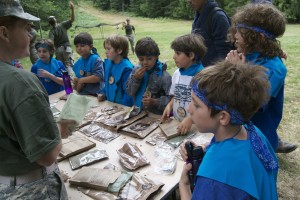No More Summers Lost: The Camp for Kids of Wounded Warriors Wounded Warrior Project works with National Military Family Association
JACKSONVILLE, Fla., Aug. 4, 2016 /PRNewswire-USNewswire/ — When the veterans who fought and sacrificed for this nation return home, they sometimes face a difficult transition back to civilian life. Since 2003, Wounded Warrior Project® (WWP) has worked tirelessly to help these warriors live successful, independent, and healthy lives. However, these veterans are not the only ones who face obstacles and challenges during the road to recovery. Some have started families and are raising children, many of whom have seen firsthand the physical, mental, and economic challenges faced by their wounded parents.

Campers enjoy arts and crafts during an Operation Purple Camp (OPC). The National Military Family Association (NMFA) runs OPC, with the support of Wounded Warrior Project. Photo courtesy of NMFA. (PRNewsFoto/Wounded Warrior Project)
With WWP’s commitment to serve warriors for a lifetime, their families and caregivers are included. The need for support and programs for children grows, with the understanding that the entire family needs to be part of the recovery process. In cases where there is a need outside WWP’s scope, the nonprofit will work alongside and support other regional and national veterans service organizations. These partnerships enhance existing WWP programs with services and support.
One of WWP’s partners that helps children of wounded veterans is the National Military Family Association (NMFA), which hosts Operation Purple® Camps (OPC). These weeklong summer camps are offered for free to children of military service members – wounded, active, or retired – and are a place where they can connect with other kids like them. The name of the camp represents mixing the colors of Army green, Coast Guard blue, Air Force blue, Marine Corps red, and Navy blue. Operation Purple Camp has served more than 58,000 military children since its inception in 2004, and more than 40% of campers in 2015 were part of families served by Wounded Warrior Project.
Eric Bird is one warrior served by WWP and NMFA. A retired United States Air Force veteran, Eric first connected with WWP at an adaptive sports camp, which Eric said “taught me how to live my life, work around my disability, and stay active. It changed the path forward in my life.”
Eric made it clear that while he has made progress in his recovery, it is still ongoing. “My injury has had an impact on my life, no question,” he said. “I have issues with my post-traumatic stress disorder still. There are nights that I wake up freaked out at times, and it wakes the family up. My wife is my caregiver, and she understands it completely. My little ones don’t understand as much as my 13- and 16-year-old children do. How do you explain that to them at such a young age?”
His children are his world – that much is clear from the way his voice lifts when mentioning them. Eric’s struggle with post-traumatic stress disorder (PTSD) has affected him as a parent. “I went from big and strong in their eyes, to going in and out of a wheelchair as my injuries require. They see my PTSD, but they don’t really understand it. We don’t talk about what happened to Dad.”
It was a family friend who first turned Eric on to the programs offered by NMFA, specifically Operation Purple Camp.
“We had friends who had gone through it, and their kids go to camp with mine,” Eric explained. “WWP gave us an overview of what it was going to be, and I thought it sounded cool. But how was my son going to react? I wanted to see what these kids would experience and go through, and how helpful and fun it would be for them.” Eric is not the only parent who has seen his children affected by the wounds of war. Marlee Purcey and her husband Scott, who served in the Army National Guard, are also struggling with post-deployment issues.
“My husband has severe PTSD, breathing issues, and arthritis in his back and knees,” Marlee said. “The PTSD is from him being convoy security, seeing vehicle accidents, and witnessing people who were executed and left on the side of the road. He saw friends’ vehicles blown up, and he took on small arms fire.”
Marlee said her beloved husband will experience bursts of anger, triggered by the stress that still haunts him from his service. She knows however, that there is help for him and for their children.
“I wanted our son to go and have fun, try new things, realize he isn’t the only one who has a wounded family member,” she said. “Every time he comes home, he has lost his voice from screaming with joy, and it takes a few days to recover it. I love seeing his excitement.”
The children who attend OPC experience an environment supported by fully-trained counselors and camp staff, who help children adapt and overcome the stressors of military life. OPC works hard to help the children of military families cope and feel comfortable with their parents’ deployments, injuries, and recovery.
Marlee said the camp not only gave her son a wonderful experience with new friendships, but it also helped him overcome some fears and work toward new goals and achievements.
“He was originally afraid of horses and now loves them,” she said. “He is always excited to go and can’t wait to attend again. He wants to spend all summer at camp.”
Eric said his son had similar experiences at OPC, with an almost immediately noticeable shift in attitude and outlook.
“He loved every single minute of it,” Eric said. “He’s not the most social kid, but he came out of his shell. His confidence was noticeably higher coming out of the camp; it’s an experience that can help build his character, and that’s priceless. He was able to spend time around other kids who have experienced the same things he has – other kids with parents like me. He’s already asking me if he can go next year.”
Marlee and Eric both had similar perspectives on what they would tell warriors who have children who might enjoy a week away at Operation Purple Camp.
“These camps are made possible because of our networks with warriors,” Eric said. “I would say, ‘Reach out and ask. WWP can help get you connected, and they share news about this sort of thing.’ From my experience, WWP keeps family in the picture as well, because they understand my PTSD affects the family as much as it does me. That’s why WWP supports this organization, and it helps my kids attend for free.”
“I cannot stress enough that this is an awesome opportunity that lets children know they are not alone in having a family that may not be considered ‘normal’ by others,” Marlee said. “There are other children at these camps who the kids can relate to, and they gain friendships that may last a lifetime.”
Every day, wounded veterans face similar challenges when they return to civilian life after military service; the visible and invisible wounds have taken their toll on even the toughest members of the armed forces. WWP meets warriors in all stages of recovery and provides mental and physical health services, employment training, and continuing education programs to aid in their recoveries.


Recent Comments